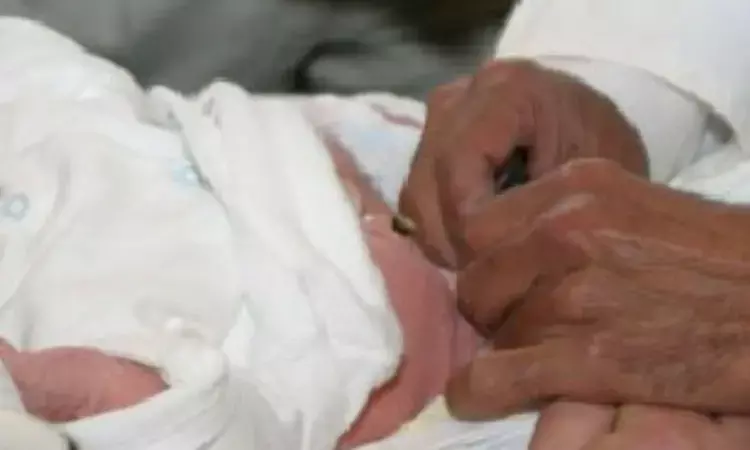- Home
- Medical news & Guidelines
- Anesthesiology
- Cardiology and CTVS
- Critical Care
- Dentistry
- Dermatology
- Diabetes and Endocrinology
- ENT
- Gastroenterology
- Medicine
- Nephrology
- Neurology
- Obstretics-Gynaecology
- Oncology
- Ophthalmology
- Orthopaedics
- Pediatrics-Neonatology
- Psychiatry
- Pulmonology
- Radiology
- Surgery
- Urology
- Laboratory Medicine
- Diet
- Nursing
- Paramedical
- Physiotherapy
- Health news
- Fact Check
- Bone Health Fact Check
- Brain Health Fact Check
- Cancer Related Fact Check
- Child Care Fact Check
- Dental and oral health fact check
- Diabetes and metabolic health fact check
- Diet and Nutrition Fact Check
- Eye and ENT Care Fact Check
- Fitness fact check
- Gut health fact check
- Heart health fact check
- Kidney health fact check
- Medical education fact check
- Men's health fact check
- Respiratory fact check
- Skin and hair care fact check
- Vaccine and Immunization fact check
- Women's health fact check
- AYUSH
- State News
- Andaman and Nicobar Islands
- Andhra Pradesh
- Arunachal Pradesh
- Assam
- Bihar
- Chandigarh
- Chattisgarh
- Dadra and Nagar Haveli
- Daman and Diu
- Delhi
- Goa
- Gujarat
- Haryana
- Himachal Pradesh
- Jammu & Kashmir
- Jharkhand
- Karnataka
- Kerala
- Ladakh
- Lakshadweep
- Madhya Pradesh
- Maharashtra
- Manipur
- Meghalaya
- Mizoram
- Nagaland
- Odisha
- Puducherry
- Punjab
- Rajasthan
- Sikkim
- Tamil Nadu
- Telangana
- Tripura
- Uttar Pradesh
- Uttrakhand
- West Bengal
- Medical Education
- Industry
Serious complications, death after neonatal circumcision higher than believed, study finds

Canada: Neonatal circumcision (NNC) is the most commonly performed surgery worldwide and is generally considered safe. Deaths related to NNC are seldomly reported and are mostly due to a lack of adherence to medical standards. Now, results from a recent study in the journal European Urology Focus indicate that the risk of death and serious complications from NNC is greater than generally assumed.
Male circumcision involves surgical removal of some, or all, of the foreskin (or prepuce) from the penis. In the US, the procedure is commonly performed during the newborn period.
For the study, Annette Schröder, Department of Urology, Hospital for Sick Children, Toronto, Canada, and the team reviewed their emergency department database for circumcision-related emergency admissions.
Based on the analysis, the researchers found the following:
- During 2000–2013, 19 previously healthy neonates were admitted for acute complications after circumcision.
- Four were admitted for bleeding, with hemophilia identified in two cases and von Willebrand disease in one.
- Eight boys required emergency surgery, three for severe bleeding.
- Four boys with amputation of the glans underwent immediate surgical reconstruction.
- One infant was taken to the operating room to remove an obstructing Plastibell ring.
- Seven boys were admitted to the intensive care unit with severe bleeding or sepsis, three of whom ultimately progressed to hemorrhagic or septic shock.
- Two of these children died of their complications.
The researchers estimate that the annual incidence of severe complications requiring hospitalization after NNC in the Greater Toronto Area was approximately 0.01%, and the incidence of fatalities over the 14-yr review period was approximately 0.0012%.
"Our results indicate that the risk of serious complications and death as a result of NNC is greater than generally assumed," they concluded.
Reference:
The study titled, "Serious and Fatal Complications after Neonatal Circumcision," was published in the journal European Urology Focus on 29 December 2021.
Dr Kamal Kant Kohli-MBBS, DTCD- a chest specialist with more than 30 years of practice and a flair for writing clinical articles, Dr Kamal Kant Kohli joined Medical Dialogues as a Chief Editor of Medical News. Besides writing articles, as an editor, he proofreads and verifies all the medical content published on Medical Dialogues including those coming from journals, studies,medical conferences,guidelines etc. Email: drkohli@medicaldialogues.in. Contact no. 011-43720751


